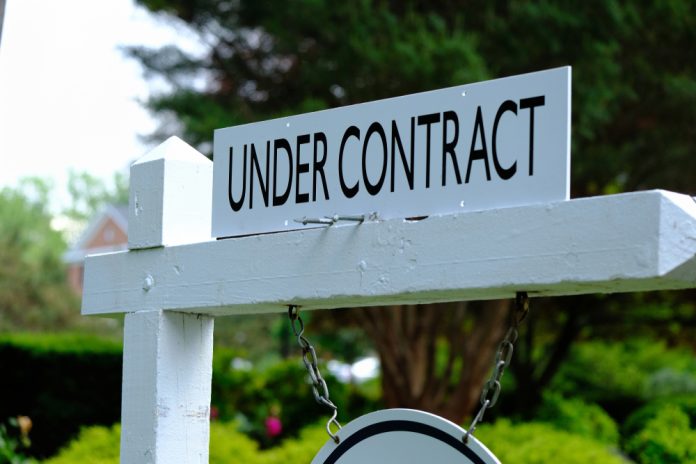When an offer is accepted and the paperwork is signed, many people breathe a sigh of relief — and then wonder, “So, what now?”
The phrase under contract gets tossed into listing statuses and conversations alike, but it covers a whole set of steps that happen between handshake and keys. Understanding what under contract actually means helps buyers and sellers avoid surprises, reduce stress, and keep the timeline moving forward.
Buyers sometimes think “under contract” means everything is finished. But that’s simply not the case. It’s when the real work is just beginning!
In this article I’ll unpack the most important stages you can expect while a property is under contract, answer the common questions I hear from both sides, and share practical tips that come from real-world experience.
What “Under Contract” Actually Means
When a property is labeled under contract, the buyer and seller have agreed on price and terms and have executed a purchase agreement. That agreement is the roadmap for the remainder of the transaction; it lists contingencies, timelines, and responsibilities. Being under contract does not mean ownership has transferred — it means the parties are committed to completing the deal, provided the contract conditions are satisfied.
From a practical standpoint, the status under contract often begins a sequence: inspections are scheduled, loan underwriting ramps up, an appraisal is ordered, and title companies start digging into records. Each of these tasks can introduce questions or bumps in the road, which is why contracts usually include contingency clauses that protect both buyers and sellers.
Think of under contract as “promised, but provisional.” You’ve promised to complete the transaction, but several objective checks must confirm the promise is sound.
Inspections and Negotiations When You’re Under Contract

Inspections are typically one of the first items on the calendar after a property goes under contract. Buyers want to confirm the home’s condition; sellers want to avoid endless rounds of repair requests. A standard inspection report might reveal minor fixes, or it may flag significant issues like structural concerns or outdated systems.
Buyers often ask whether they can back out after inspections. The answer depends on the contingency language in the contract. If the agreement contains an inspection contingency, buyers usually have a defined window to request repairs, renegotiate, or, in serious cases, terminate the contract. Sellers, understandably, worry about unrealistic repair asks; the best defense is clear documentation of the home’s condition and reasonable, market-based responses.
My practical tip: prioritize inspections early and choose experienced inspectors. A thorough inspection completed quickly gives everyone time to negotiate in good faith while the property remains under contract, rather than scrambling late in the timeline.
The Appraisal: A Critical Checkpoint When Under Contract

The appraisal is the lender’s reality check. Even if a buyer offers above list price, the lender orders an appraisal to verify the home’s value so they don’t lend more than the property can support. When an appraisal comes in at or above the contract price, things usually proceed smoothly.
Low appraisals are the common worry. Buyers ask, “What happens if the appraisal is low?” Often there are three routes: negotiate a lower price with the seller, the buyer brings additional cash to cover the gap, or the parties agree to another solution like a second appraisal request or adjusted financing terms. Sellers ask whether multiple offers will influence the appraisal; typically, appraisers use recent comparable sales, so a single high offer won’t necessarily change the appraised value.
The smartest sellers prepare a comps package and point out any improvements that justify the price. Buyers should be prepared with their own financing flexibility or negotiation strategy before the appraisal arrives so they’re not making decisions under pressure.
Financing and Underwriting While You Wait to Close

Being under contract triggers serious work from lenders. Pre-approval is good, but final underwriting still requires documentation, income verification, appraisal results, and sometimes additional clarifications. Buyers commonly ask, “Am I guaranteed financing now?” The answer is no — until underwriting clears and the lender issues a clear-to-close, financing is not guaranteed.
Sellers want to know what happens if a buyer’s loan falls apart. A buyer who loses financing may be able to extend, find alternative loan products, or — if necessary — terminate based on financing contingencies. That’s why agents vet buyers’ financial strength before accepting offers when possible, especially in competitive markets.
Here’s one practical habit that saves time: keep financial documents organized and responsive. Lenders move faster when buyers promptly supply pay stubs, bank statements, and explanations for any large deposits. That responsiveness helps keep the deal under contract on the path to closing.
Title, Paperwork, and Keeping the Deal on Track

Title work is the behind-the-scenes legal check. Title companies confirm ownership history, search for liens, and prepare the documents needed to transfer title. If a lien or easement pops up, it can slow the process while it’s resolved. That’s why early title searches are standard once a property is under contract.
Both buyers and sellers should review closing documents carefully before the final signing. Buyers will receive a closing disclosure detailing loan terms and closing costs, and sellers receive statements that summarize net proceeds. Small errors in names, property descriptions, or payoff amounts can cause last-minute delays.
Deals can be delayed for as little as a misspelled name on a payoff statement. Attention to detail and good communication with your title officer or attorney can keep things smooth while the contract period runs its course.
Next Steps and Staying Informed

When you see a listing marked under contract, remember it’s a significant milestone but not the finish line. Inspections, appraisals, underwriting, and title work all play roles in whether a sale successfully closes. My advice for buyers and sellers is simple: stay organized, keep communication lines open, and lean on your agent to interpret contingencies and deadlines.
If you’re in the middle of a transaction, don’t hesitate to ask for explanations. A few proactive conversations now can prevent misunderstandings later. And if you’re planning to enter the market, understanding the steps that happen while a property is under contract will help you move confidently when the right opportunity appears.
FAQ
What does under contract mean for buyers?
For buyers, under contract means your offer was accepted and the purchase agreement is active; however, you still need to complete inspections, satisfy financing contingencies, and wait for the appraisal and title clearance before ownership transfers.
Can a seller accept another offer while a property is under contract?
Typically, once under contract the seller has limited ability to accept another binding offer unless the current contract is contingent or the buyer defaults; some contracts allow backups, but the original contract holds priority until it is terminated or expires under its terms.
What happens if the appraisal is lower than the contract price?
If the appraisal comes in low, common options include renegotiating the price, the buyer bringing extra cash, challenging the appraisal with additional comps, or, if a financing contingency exists, the buyer may be able to walk away.
How long does the under contract period usually last?
The timeline varies but is often 30 to 45 days depending on loan type, inspection schedules, and the complexity of title work; contracts will specify deadlines, and parties can sometimes agree to extensions if needed.
Should I keep making plans before closing when a home is under contract?
It’s wise to be cautiously optimistic: make preliminary plans but avoid irreversible actions until closing is complete, since contingencies or financing issues can still arise while the property is under contract.




